人教版七年级下册英语 Unit 4 Don't eat in class.课件 (共54张PPT)
文档属性
| 名称 | 人教版七年级下册英语 Unit 4 Don't eat in class.课件 (共54张PPT) |  | |
| 格式 | pptx | ||
| 文件大小 | 21.8MB | ||
| 资源类型 | 教案 | ||
| 版本资源 | 人教新目标(Go for it)版 | ||
| 科目 | 英语 | ||
| 更新时间 | 2023-03-18 19:42:38 | ||
图片预览


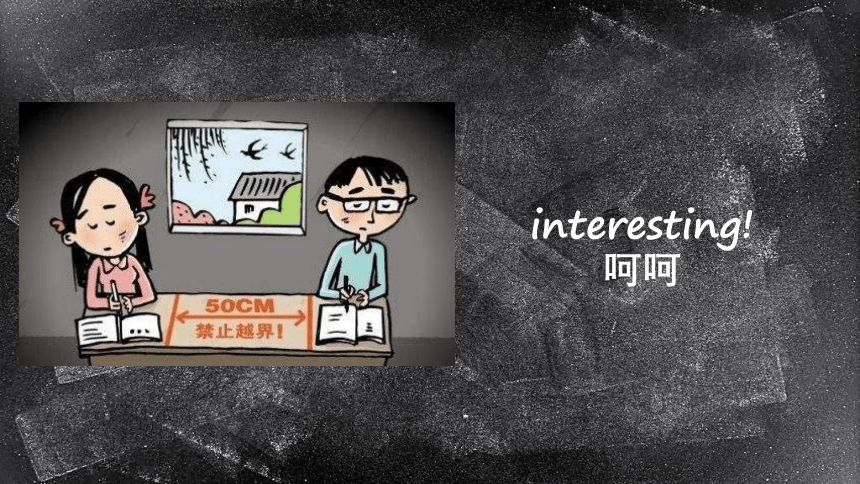
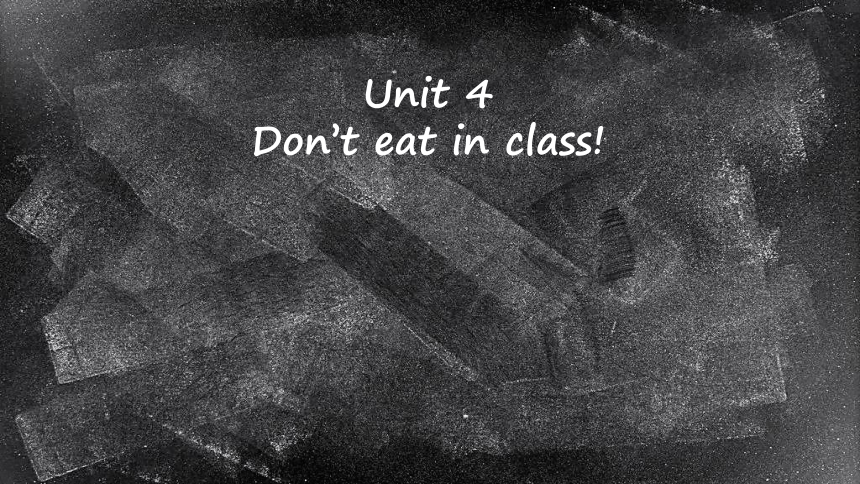

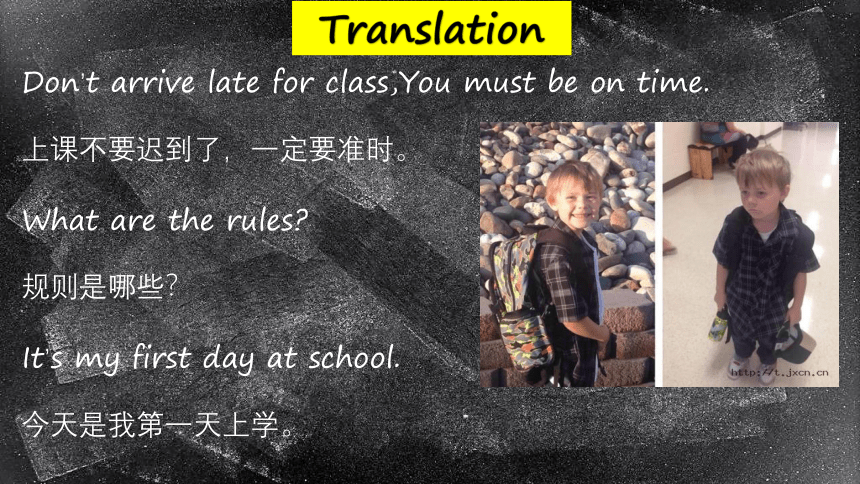
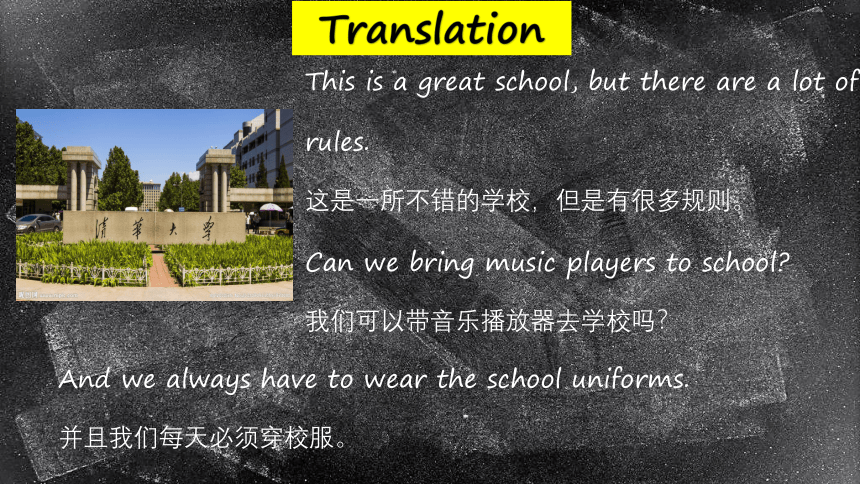
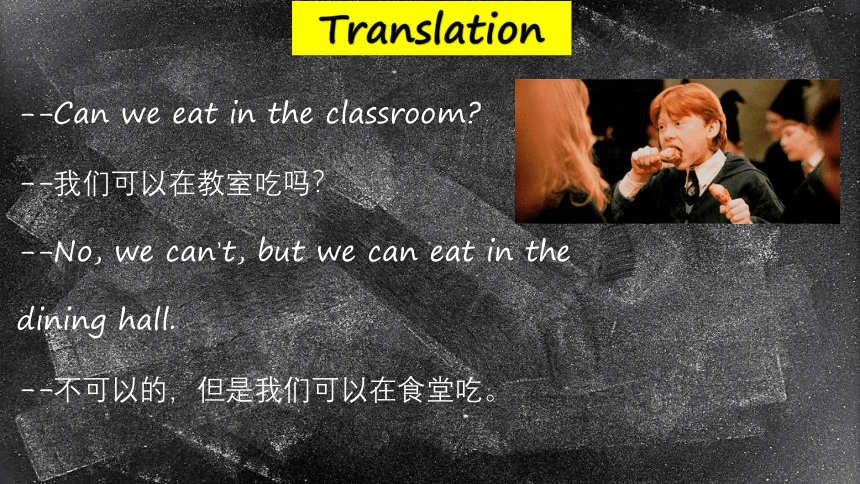
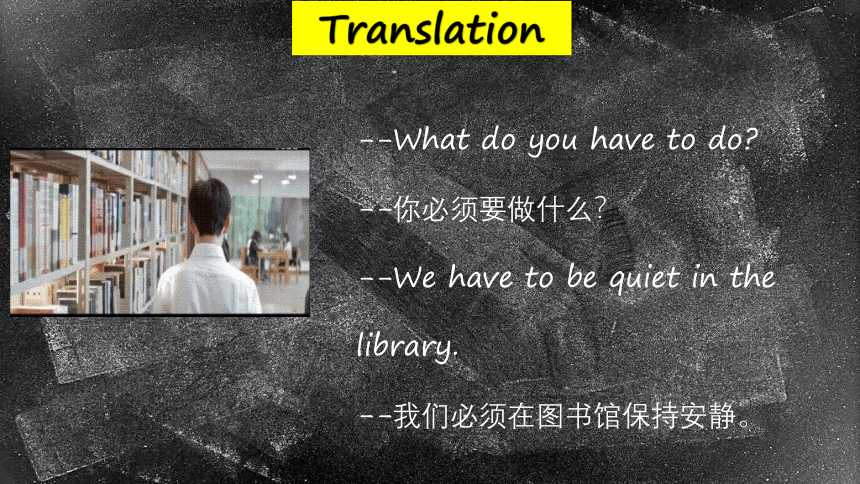

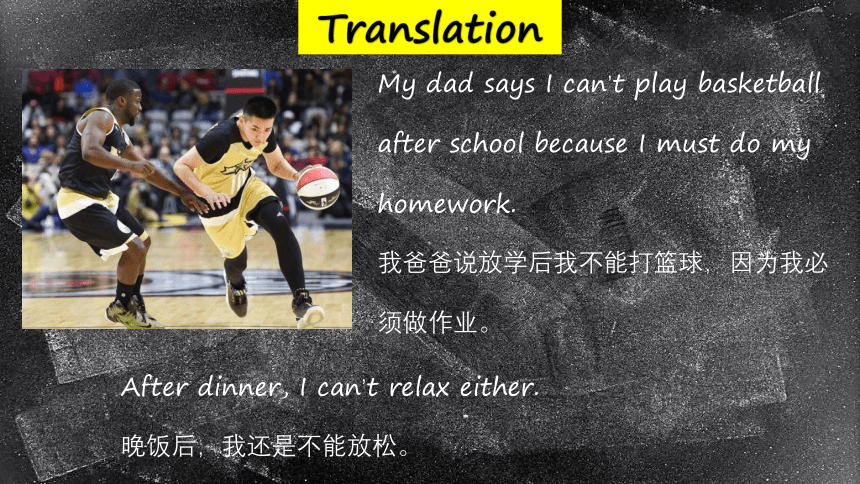
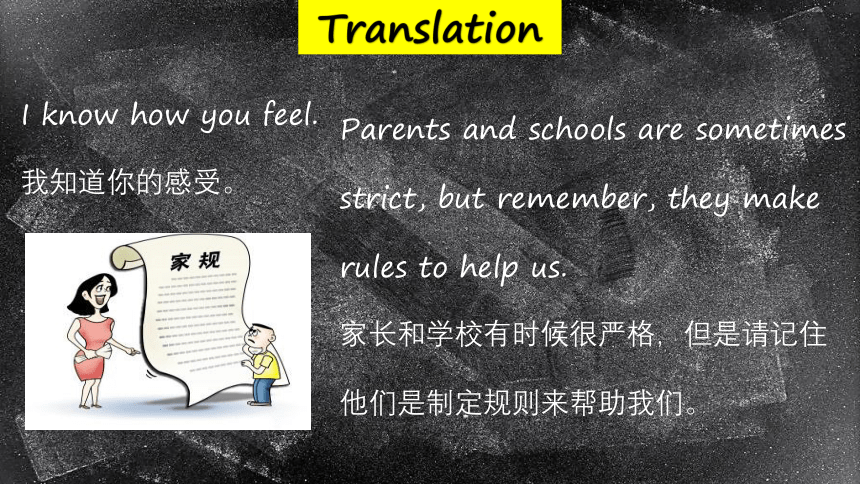
文档简介
(共54张PPT)
school rules
keep hair short
interesting!
呵呵
Unit 4
Don’t eat in class!
1. Translation
Translation
Don’t arrive late for class,You must be on time.
上课不要迟到了,一定要准时。
What are the rules
规则是哪些?
It’s my first day at school.
今天是我第一天上学。
Translation
This is a great school, but there are a lot of rules.
这是一所不错的学校,但是有很多规则。
Can we bring music players to school
我们可以带音乐播放器去学校吗?
And we always have to wear the school uniforms.
并且我们每天必须穿校服。
Translation
--Can we eat in the classroom
--我们可以在教室吃吗?
--No, we can’t, but we can eat in the dining hall.
--不可以的,但是我们可以在食堂吃。
Translation
--What do you have to do
--你必须要做什么?
--We have to be quiet in the library.
--我们必须在图书馆保持安静。
Translation
At my dream school, we don’t have to come to school every day.
我梦想的学校是我们不必每天上学。
Get up now and make your bed.
现在马上起来并整理好床铺!
Don’t leave the dirty dishes in the kitchen.
不要将垃圾留在厨房里。
Translation
My dad says I can’t play basketball after school because I must do my homework.
我爸爸说放学后我不能打篮球,因为我必须做作业。
After dinner, I can’t relax either.
晚饭后,我还是不能放松。
Translation
I know how you feel.
我知道你的感受。
Parents and schools are sometimes strict, but remember, they make rules to help us.
家长和学校有时候很严格,但是请记住他们是制定规则来帮助我们。
Translation
We have to follow them.
我必须遵守它们。
And I have to keep my hair short.
而且我必须要留短发。
I never have fun.
我从来都不开心。
Translation
I think it’s best to follow the rules.
我认为最好还是遵守规定。
*What else You can’t fight with your classmates.
还有吗?你不能跟同学打架。
*That makes the teachers really unhappy.
那样真的会使老师很不高兴。
Translation
*What other rules do you have
你们还有什么其他的规定吗?
*I must practice guitar before dinner and then I have to do the dishes after dinner.
我晚饭之前必须训练吉他,之后我还要洗碗。
2. Word bank
Word Bank
hall
dish
before
more
sorry
read
terrible
feel
bring
hair
out
抱歉的;难过的;惋惜的
碟;盘
非常讨厌的;可怕的
感受;觉得
在……以前
带来;取来
大厅;礼堂
头发;毛发
外出
更多的
读;阅读
practice, learn, wear, remember, outside,
feel, noisy, arrive, dirty, rule, keep
Fill in the blanks. (One word is extra)
1. Don’t ______ late for class. You must be on time.
2. There are lots of _____ in our school.
3. You can listen to music ______ the classroom.
4. ________ makes perfect.
5. After their fight, both of the boys are really _____.
Word Bank
arrive
rules
outside
Practice
dirty
practice, learn, wear, remember, outside,
feel, noisy, arrive, dirty, rule, keep
Fill in the blanks. (One word is extra)
6. Do you still __________ the way to your hometown
7. I like to _____ different skills.
8. My teacher always ______ his clothes clean.
9. I can’t sleep well because it is too ______ outside.
10. Lucy ______ a beautiful white dress today.
Word Bank
remember
learn
keeps
noisy
wears
Fill in the blanks.
1. You can eat your breakfast in the d______ hall over there.
2. My brother likes to l______ to quiet music.
3. The soldiers must f_____ to protect their country.
4. It is very i________t to be on time for your class.
5. Everyone needs to be q_____ in the library.
Word Bank
dining
listen
fight
important
quiet
Fill in the blanks.
6. My mother never leaves dirty dishes in the k_______.
7. You can r____ after you finish your homework.
8. Every student must f_____ the rules .
9. My father is very s_____ with me.
10. Good l____ to your , my dear friend.
Word Bank
kitchen
relax
follow
strict
luck
3. Open your mouth
Open your mouth
Topic 1 Obey the rules
We can’t arrive late for class.
We must be on time.
Open your mouth
Topic 2 Ask for permission
A: Can I listen to music here
B: Yes, you can./No, you can’t.
Open your mouth
Topic 3 Ask the rules
A: What are the rules at school
B: We must ……/We can’t ……
Open your mouth
Topic 4 Free talks
Talk about some rules in your daily life.
Key words : rule, arrive, dining, listen, fight, outside, wear, important, quiet, practice, dirty, kitchen, noisy, relax, strict, remember, follow, luck, keep, learn
4. Key points
祈使句
。
1. 概念:
用于表达命令、请求、劝告、警告、禁止等的句子叫做祈使句
e.g. Open your mouth.
Don’t arrive late.
Be kind to others.
祈使句
。
2. 分类:第二人称&第一,三人称
a. 第二人称的祈使句
结构:肯定句动词原形开头
否定句在动词原形前面加Don’t
e.g. Open the door.
Don’t open the door.
*祈使句
。
b. 第一,三人称的祈使句:
let sb. do sth. 让某人做某事
let sb. not do sth. 让某人不做某事
e.g. Let us go to the cinema.
Let them not talk in class.
*祈使句
。
c. 还有一种祈使句:
No parking
No smoking
No photos
rule
。
cn. 规则;规定
e.g. We must obey the rules of the game.
n. 统治者;直尺
vt. 统治
e.g. He ruled a huge empire in ancient China and he was a great ruler.
vi. 到达;来到
e.g. He arrives before class begins.
*注意:arrive是瞬间动词,不用于表达动作的延续,因此不与表示一段时间的状语连用。
【误】They arrived here for three days.
【正】They have been here for three days.
arrive
rule
拓展:
follow/obey/keep the rules 遵守规则
school/class/family rules 校/班/家规
break the rules 违反规定
make rules 制定规则
*as a rule 通常;一般而言
arrive/reach/get
三者均有“抵达某地”之意。
arrive vi. in + 较大的场所(国家、城市等)
at + 较小的场所(学校、家等)
reach vt. 后面直接接地点名词
get vi. 后常接to表示 “到达”
e.g. What time did the plane arrive in New York
She reached Beijing safely.
When will they get to that village
on time
on time 准时;按时
e.g. Do you always arrive at school on time
*拓展:与time相关的短语
all the time 一直 = always
have a good time 玩得愉快
in time 及时;迟早;早晚
take one's time 慢慢来
kill/pass time 打发时间
at the same time 同时
at times 有时 = sometimes
要迟到了
listen
vi. 听;倾听(与to连用后接所听的内容)
e.g. They are listening to music.
Please listen to me carefully.
listen (to)/hear/sound
listen (to) 强调听的过程和动作。
hear vt. “听见;听到”强调听的结果和内容。
sound 系v. “听起来”,后接形容词或like短语作表语。
e.g. –Listen! What can you hear
--It sounds like a cat.
in class/in the class/
in the classroom
in class 在课堂上;上课时,与after class(课后)相对。
in the class 在这个/那个班上
e.g. There are 45 sthdents in the class.
in the classroom 在教室里
e.g. We should keep
quiet in the classroom.
fight
(1)vi. 打架;打仗 fight – fought - fought.
e.g. Stop fighting! The teacher is coming.
(2)n. 打架;吵架
have a fight (with sb.) (与某人)打架
e.g. The two boys had a fight yesterday.
fight
fight for 为……而斗争
e.g. They are fighting for the freedom.
fight with+人/国家,同……战斗(战友)
fight aganist 为反对……而战(对手)
e.g. We are fighting against our enemies.
outside
(1)adv. 外面地;在外部
e.g. It's snowing heavily outside.
(2)prep. 在……外
e.g. Let's meet outside the school gate.
(3)n. 外部;外面。
e.g. The outside of the house is blue.
eat
vt. 吃 eat – ate - eaten
eat out 在外面吃饭;下馆子
eat up 吃光
*eat one’s words 食言
wear
vt. 穿;戴(强调状态,+衣服/饰品)
e.g. She's wearing a new dress.
拓展:wear的更多含义
(1)留/蓄(毛发、胡子)
e.g. He wears long beard.
*(2)表露(表情、态度等)
e.g. The girl always wears a happy smile.
dress/put on/wear/in
dress 只能接人作宾语,意为“给……穿衣服”;“自己穿衣”可以说get dressed或dress oneself;dress up意为“乔装打扮”
put on 强调穿、戴的动作,可接衣服或鞋、帽名词作宾语,反义短语是take off.
wear 强调穿、戴的状态,可接衣服、鞋、帽或身上的饰品名词等作宾语。
in 是介词,表示穿的状态,后接表示衣服或颜色的词,构成的短语只能作表语或定语。
e.g. Put on your coat. It’s cold outside.
Kevin is wearing a special T-shirt.
Tom, dress your brother.
The boy in green is very cool.
bring
vt. 带来;取来
bring sb. sth. =bring sth. to sb. 带某物给某人
e.g. Please bring your family photo to school tomorrow.
bring/carry/fetch/take
bring 带来(尤指从远处带来)
carry 带(无方向性,指移动较重、较大的东西,有“负重”的含义)
e.g. They are carrying some paintings to the art gallery.
fetch,(去)取(物)来, (去)带(人)来,指取了东西后再返回出发点,包括三个动作:go , get and bring.
e.g. Tom, help me fetch a glass of water from the kitchen.
take 带走(尤指从近处带到远处,还可指“带着”)
e.g. Take the box away,please.
quiet
adj. 安静的;平静的。
e.g. You have to keep quiet in the library.
quietly.副词,安静地;轻轻地。
*辨析 quiet,silent,still与calm
quiet 安静的(指寂静的状态,没有吵闹、骚乱;指人时表示“娴静的;文静的”)
silent 沉默的;无言的(主要指人不发出声音或不说话,强调无声的状态)
still 不动的;静止的(指物理上的安静状态)
calm 镇静的;平静的(指不受干扰时的宁静;指人时表示“沉着的;镇定的”)
5. Reading for fun
k
Reading for fun
shortcut n. 捷径;近路
miss v. 错过
rollerblade n. 一字轮旱冰鞋
grab v. 抓
ache v. 痛
set off 动身,出发
k
answers
a. 1. back 2. get 3. kitchen 4. climb
b. 1. F
2. T
3. F
4. F
6. Have a try
k
Have a try
每所学校都有自己的规章制度, 下面是你们学校的一些规章制度。请向你的新同学Lucy做一下介绍,要求如下:
1.上课不准迟到, 必须准时到校。
2. 穿校服去学校, 必须要留短发。
3. 不许在教室里吃东西,要在餐厅里面去吃。
4. 不许在课堂上听音乐或玩游戏, 在图书馆必须安静。
5. 自己补充一两点。
Welcome to our school. Here are some of our school rules. ____________________________________
Homework
school rules
keep hair short
interesting!
呵呵
Unit 4
Don’t eat in class!
1. Translation
Translation
Don’t arrive late for class,You must be on time.
上课不要迟到了,一定要准时。
What are the rules
规则是哪些?
It’s my first day at school.
今天是我第一天上学。
Translation
This is a great school, but there are a lot of rules.
这是一所不错的学校,但是有很多规则。
Can we bring music players to school
我们可以带音乐播放器去学校吗?
And we always have to wear the school uniforms.
并且我们每天必须穿校服。
Translation
--Can we eat in the classroom
--我们可以在教室吃吗?
--No, we can’t, but we can eat in the dining hall.
--不可以的,但是我们可以在食堂吃。
Translation
--What do you have to do
--你必须要做什么?
--We have to be quiet in the library.
--我们必须在图书馆保持安静。
Translation
At my dream school, we don’t have to come to school every day.
我梦想的学校是我们不必每天上学。
Get up now and make your bed.
现在马上起来并整理好床铺!
Don’t leave the dirty dishes in the kitchen.
不要将垃圾留在厨房里。
Translation
My dad says I can’t play basketball after school because I must do my homework.
我爸爸说放学后我不能打篮球,因为我必须做作业。
After dinner, I can’t relax either.
晚饭后,我还是不能放松。
Translation
I know how you feel.
我知道你的感受。
Parents and schools are sometimes strict, but remember, they make rules to help us.
家长和学校有时候很严格,但是请记住他们是制定规则来帮助我们。
Translation
We have to follow them.
我必须遵守它们。
And I have to keep my hair short.
而且我必须要留短发。
I never have fun.
我从来都不开心。
Translation
I think it’s best to follow the rules.
我认为最好还是遵守规定。
*What else You can’t fight with your classmates.
还有吗?你不能跟同学打架。
*That makes the teachers really unhappy.
那样真的会使老师很不高兴。
Translation
*What other rules do you have
你们还有什么其他的规定吗?
*I must practice guitar before dinner and then I have to do the dishes after dinner.
我晚饭之前必须训练吉他,之后我还要洗碗。
2. Word bank
Word Bank
hall
dish
before
more
sorry
read
terrible
feel
bring
hair
out
抱歉的;难过的;惋惜的
碟;盘
非常讨厌的;可怕的
感受;觉得
在……以前
带来;取来
大厅;礼堂
头发;毛发
外出
更多的
读;阅读
practice, learn, wear, remember, outside,
feel, noisy, arrive, dirty, rule, keep
Fill in the blanks. (One word is extra)
1. Don’t ______ late for class. You must be on time.
2. There are lots of _____ in our school.
3. You can listen to music ______ the classroom.
4. ________ makes perfect.
5. After their fight, both of the boys are really _____.
Word Bank
arrive
rules
outside
Practice
dirty
practice, learn, wear, remember, outside,
feel, noisy, arrive, dirty, rule, keep
Fill in the blanks. (One word is extra)
6. Do you still __________ the way to your hometown
7. I like to _____ different skills.
8. My teacher always ______ his clothes clean.
9. I can’t sleep well because it is too ______ outside.
10. Lucy ______ a beautiful white dress today.
Word Bank
remember
learn
keeps
noisy
wears
Fill in the blanks.
1. You can eat your breakfast in the d______ hall over there.
2. My brother likes to l______ to quiet music.
3. The soldiers must f_____ to protect their country.
4. It is very i________t to be on time for your class.
5. Everyone needs to be q_____ in the library.
Word Bank
dining
listen
fight
important
quiet
Fill in the blanks.
6. My mother never leaves dirty dishes in the k_______.
7. You can r____ after you finish your homework.
8. Every student must f_____ the rules .
9. My father is very s_____ with me.
10. Good l____ to your , my dear friend.
Word Bank
kitchen
relax
follow
strict
luck
3. Open your mouth
Open your mouth
Topic 1 Obey the rules
We can’t arrive late for class.
We must be on time.
Open your mouth
Topic 2 Ask for permission
A: Can I listen to music here
B: Yes, you can./No, you can’t.
Open your mouth
Topic 3 Ask the rules
A: What are the rules at school
B: We must ……/We can’t ……
Open your mouth
Topic 4 Free talks
Talk about some rules in your daily life.
Key words : rule, arrive, dining, listen, fight, outside, wear, important, quiet, practice, dirty, kitchen, noisy, relax, strict, remember, follow, luck, keep, learn
4. Key points
祈使句
。
1. 概念:
用于表达命令、请求、劝告、警告、禁止等的句子叫做祈使句
e.g. Open your mouth.
Don’t arrive late.
Be kind to others.
祈使句
。
2. 分类:第二人称&第一,三人称
a. 第二人称的祈使句
结构:肯定句动词原形开头
否定句在动词原形前面加Don’t
e.g. Open the door.
Don’t open the door.
*祈使句
。
b. 第一,三人称的祈使句:
let sb. do sth. 让某人做某事
let sb. not do sth. 让某人不做某事
e.g. Let us go to the cinema.
Let them not talk in class.
*祈使句
。
c. 还有一种祈使句:
No parking
No smoking
No photos
rule
。
cn. 规则;规定
e.g. We must obey the rules of the game.
n. 统治者;直尺
vt. 统治
e.g. He ruled a huge empire in ancient China and he was a great ruler.
vi. 到达;来到
e.g. He arrives before class begins.
*注意:arrive是瞬间动词,不用于表达动作的延续,因此不与表示一段时间的状语连用。
【误】They arrived here for three days.
【正】They have been here for three days.
arrive
rule
拓展:
follow/obey/keep the rules 遵守规则
school/class/family rules 校/班/家规
break the rules 违反规定
make rules 制定规则
*as a rule 通常;一般而言
arrive/reach/get
三者均有“抵达某地”之意。
arrive vi. in + 较大的场所(国家、城市等)
at + 较小的场所(学校、家等)
reach vt. 后面直接接地点名词
get vi. 后常接to表示 “到达”
e.g. What time did the plane arrive in New York
She reached Beijing safely.
When will they get to that village
on time
on time 准时;按时
e.g. Do you always arrive at school on time
*拓展:与time相关的短语
all the time 一直 = always
have a good time 玩得愉快
in time 及时;迟早;早晚
take one's time 慢慢来
kill/pass time 打发时间
at the same time 同时
at times 有时 = sometimes
要迟到了
listen
vi. 听;倾听(与to连用后接所听的内容)
e.g. They are listening to music.
Please listen to me carefully.
listen (to)/hear/sound
listen (to) 强调听的过程和动作。
hear vt. “听见;听到”强调听的结果和内容。
sound 系v. “听起来”,后接形容词或like短语作表语。
e.g. –Listen! What can you hear
--It sounds like a cat.
in class/in the class/
in the classroom
in class 在课堂上;上课时,与after class(课后)相对。
in the class 在这个/那个班上
e.g. There are 45 sthdents in the class.
in the classroom 在教室里
e.g. We should keep
quiet in the classroom.
fight
(1)vi. 打架;打仗 fight – fought - fought.
e.g. Stop fighting! The teacher is coming.
(2)n. 打架;吵架
have a fight (with sb.) (与某人)打架
e.g. The two boys had a fight yesterday.
fight
fight for 为……而斗争
e.g. They are fighting for the freedom.
fight with+人/国家,同……战斗(战友)
fight aganist 为反对……而战(对手)
e.g. We are fighting against our enemies.
outside
(1)adv. 外面地;在外部
e.g. It's snowing heavily outside.
(2)prep. 在……外
e.g. Let's meet outside the school gate.
(3)n. 外部;外面。
e.g. The outside of the house is blue.
eat
vt. 吃 eat – ate - eaten
eat out 在外面吃饭;下馆子
eat up 吃光
*eat one’s words 食言
wear
vt. 穿;戴(强调状态,+衣服/饰品)
e.g. She's wearing a new dress.
拓展:wear的更多含义
(1)留/蓄(毛发、胡子)
e.g. He wears long beard.
*(2)表露(表情、态度等)
e.g. The girl always wears a happy smile.
dress/put on/wear/in
dress 只能接人作宾语,意为“给……穿衣服”;“自己穿衣”可以说get dressed或dress oneself;dress up意为“乔装打扮”
put on 强调穿、戴的动作,可接衣服或鞋、帽名词作宾语,反义短语是take off.
wear 强调穿、戴的状态,可接衣服、鞋、帽或身上的饰品名词等作宾语。
in 是介词,表示穿的状态,后接表示衣服或颜色的词,构成的短语只能作表语或定语。
e.g. Put on your coat. It’s cold outside.
Kevin is wearing a special T-shirt.
Tom, dress your brother.
The boy in green is very cool.
bring
vt. 带来;取来
bring sb. sth. =bring sth. to sb. 带某物给某人
e.g. Please bring your family photo to school tomorrow.
bring/carry/fetch/take
bring 带来(尤指从远处带来)
carry 带(无方向性,指移动较重、较大的东西,有“负重”的含义)
e.g. They are carrying some paintings to the art gallery.
fetch,(去)取(物)来, (去)带(人)来,指取了东西后再返回出发点,包括三个动作:go , get and bring.
e.g. Tom, help me fetch a glass of water from the kitchen.
take 带走(尤指从近处带到远处,还可指“带着”)
e.g. Take the box away,please.
quiet
adj. 安静的;平静的。
e.g. You have to keep quiet in the library.
quietly.副词,安静地;轻轻地。
*辨析 quiet,silent,still与calm
quiet 安静的(指寂静的状态,没有吵闹、骚乱;指人时表示“娴静的;文静的”)
silent 沉默的;无言的(主要指人不发出声音或不说话,强调无声的状态)
still 不动的;静止的(指物理上的安静状态)
calm 镇静的;平静的(指不受干扰时的宁静;指人时表示“沉着的;镇定的”)
5. Reading for fun
k
Reading for fun
shortcut n. 捷径;近路
miss v. 错过
rollerblade n. 一字轮旱冰鞋
grab v. 抓
ache v. 痛
set off 动身,出发
k
answers
a. 1. back 2. get 3. kitchen 4. climb
b. 1. F
2. T
3. F
4. F
6. Have a try
k
Have a try
每所学校都有自己的规章制度, 下面是你们学校的一些规章制度。请向你的新同学Lucy做一下介绍,要求如下:
1.上课不准迟到, 必须准时到校。
2. 穿校服去学校, 必须要留短发。
3. 不许在教室里吃东西,要在餐厅里面去吃。
4. 不许在课堂上听音乐或玩游戏, 在图书馆必须安静。
5. 自己补充一两点。
Welcome to our school. Here are some of our school rules. ____________________________________
Homework
同课章节目录
- Unit 1 Can you play the guitar?
- Section A
- Section B
- Unit 2 What time do you go to school?
- Section A
- Section B
- Unit 3 How do you get to school?
- Section A
- Section B
- Unit 4 Don't eat in class.
- Section A
- Section B
- Unit 5 Why do you like pandas?
- Section A
- Section B
- Unit 6 I'm watching TV.
- Section A
- Section B
- Review of Units 1-6
- Unit 7 It's raining!
- Section A
- Section B
- Unit 8 Is there a post office near here?
- Section A
- Section B
- Unit 9 What does he look like?
- Section A
- Section B
- Unit 10 I'd like some noodles.
- Section A
- Section B
- Unit 11 How was your school trip?
- Section A
- Section B
- Unit 12 What did you do last weekend?
- Section A
- Section B
